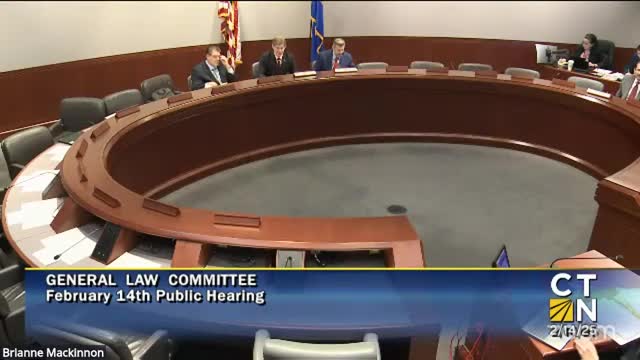State consumer protection, liquor and drug-control bills draw questions on seltzers, kratom and enforcement
Get AI-powered insights, summaries, and transcripts
Subscribe
Summary
Department of Consumer Protection officials pitched a package of bills to tighten liquor permitting, add new controlled substances and boost gambling enforcement. Lawmakers pressed the agency on child-resistant caps for THC beverages, tools to stop unregulated products, and whether kratom belongs on the controlled list.
The Department of Consumer Protection (DCP) outlined bills on Feb. 14 to streamline liquor permitting, broaden drug controls and strengthen gambling enforcement, prompting detailed questioning from legislators about safety rules, enforcement tools and the balance between public health and industry costs.
The nut graf DCP told the committee it sought several changes: an education program for new liquor permittees and expanded restaurant-caterer permits for assisted living; in the drug-control bill the department proposed adding certain intoxicating substances (including kratom) to the controlled list and creating a receivership process for failing cannabis businesses; and in gaming the department asked for strengthened enforcement and authority to pursue unlicensed sweepstakes-style operations.
Key proposals and committee concerns Commissioner Caffarelli described three DCP bills (liquor HB6854, drug control HB6855 and gaming SB1235) aimed at public safety and better regulatory tools. He said the liquor bill would extend restaurant-caterer permits to assisted living and launch a free education class for new permittees paid for by grant funding. Caitlin Anderson, director of Liquor Control, told lawmakers assisted living venues can now hold limited service but the bill would remove barriers and allow more flexible service under a permit class.
In the drug control measure the department proposed to designate some emerging intoxicating products as controlled substances and to restrict sales of raw hemp and manufactured hemp products behind a counter for 21 and older. The department also sought authority to create a receivership option for failing cannabis businesses so a receiver could ensure continued compliance with Connecticut law if a licensed operation becomes insolvent.
Lawmakers pressed DCP on the proposal to require child‑resistant caps on THC seltzers. DCP argued that bright, attractive cans and small THC doses could cause accidental ingestion by children and that child-resistant packaging would reduce risk and create parity across products. Industry witnesses and members of the committee said the measure could impose steep costs on startups and small Connecticut manufacturers; several asked for evidence of local ingestion incidents to justify the rule. Commissioner Caffarelli noted other states have adopted such packaging to reduce accidental ingestion and said the intent was public health protection.
Kratom and enforcement Republican and Democratic lawmakers urged DCP to explain procedures for rapidly identifying new harmful “designer” intoxicants sold in convenience stores and to outline the department’s interactions with local law enforcement when unregulated products appear. Several legislators said they’d received constituent complaints about convenience stores selling unregulated intoxicants to minors. DCP said the bill contains tools to schedule new substances by administrative policies and procedures and to support local law enforcement actions.
Gaming, lottery and advertising On gaming, DCP described proposed steps to tighten penalties for illegal gambling operations and to prohibit advertising that effectively links regulated operators with offshore illegal sites; licensees would have 10 days to cure noncompliant ads or face action. Several legislators followed up on retail sales agent licensing and the lottery’s retail conversion, seeking clarity on due process in license suspensions and on communication expectations between the lottery and regulators.
Ending The committee signaled follow-up hearings and drafting changes are likely: members want clearer cost estimates for packaging rules, more detail on kratom and designer substance scheduling mechanics, and refined due‑process language for gaming and lottery licensing changes before any bill is reported out.
